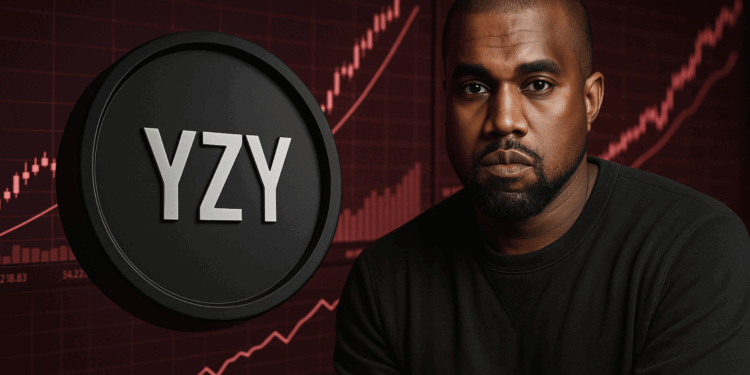- Kanye West’s YZY token hit $3B in 40 minutes on Solana before falling back to ~$1B amid insider selling concerns.
- On-chain data shows insiders controlled up to 94% of supply, sparking fears of manipulation, though some traders walked away with millions.
- Despite red flags, whales and traders like Arthur Hayes and James Wynn are still betting on YZY for short-term gains.
Kanye West, now known simply as Ye, has shaken up the crypto world with the launch of his YZY token on Solana. Within just 40 minutes of going live, the token exploded to a staggering $3 billion valuation—before crashing down to about $1 billion as whispers of insider dumping spread across the market. It’s a rollercoaster launch that feels all too familiar in the celebrity memecoin era.
On Thursday, Ye posted the official contract address and website for Yeezy Money, which he boldly described as “A NEW ECONOMY, BUILT ON CHAIN.” The site pitches YZY as the currency behind a financial ecosystem powered by crypto rails, with Ye himself later confirming: “the official YZY token just dropped.”
The hype was instant, but so was the chaos. Analytics platform Nansen confirmed the $3B peak before losses mounted. In the fine print, the site also slipped in warnings: YZY isn’t available in certain jurisdictions and users should be aware of the “potential for complete loss.”
Allegations of Insider Trading
Despite Ye’s vision of fairness, on-chain sleuths quickly spotted red flags. The Yeezy Money team deployed 25 contract addresses, supposedly to stop snipers, but most of the supply ended up in the hands of insiders anyway. Coinbase director Conor Grogan flagged that 94% of tokens were controlled by insiders, with one multisig wallet alone holding 87% before distribution.
Some traders got burned. One user mistakenly bought the wrong token and lost $710K, though they later recovered by snagging the real YZY. Others scored big—one early buyer cleared $6 million in profit, while another raked in $3.4 million after paying $24K in Solana fees just to front-run other buyers. Lookonchain also warned that only YZY tokens were initially added to liquidity pools, meaning devs could pull liquidity at any time.
Whales and Traders Still Jumping In
Even with the drama, whales haven’t been scared away. Leverage trader James Wynn admitted he aped into YZY on a 60% dip, betting it could play out like Trump’s memecoin, which surged 4x in under 30 hours. BitMEX co-founder Arthur Hayes also appears to have bought in, further fueling speculation that the token might hold short-term momentum despite shaky foundations.
Still, Wynn was blunt: this isn’t a long-term play. For him and others, YZY is all about liquidity and quick returns, not fundamentals. That mindset alone might explain why celebrity tokens keep drawing in traders, even when risk signals are flashing red.
The Celebrity Memecoin Craze
Ye isn’t the first high-profile figure to wade into the memecoin waters. Earlier this year, Argentina’s President Javier Milei boosted the LIBRA token before deleting his post and sparking a crash, while Donald Trump rolled out his TRUMP token ahead of his inauguration. Both stirred controversy, and Ye’s YZY token seems to be following the same wild path—massive hype, insider questions, and unpredictable swings.
For now, YZY sits near $1 billion in market cap, a steep drop from its $3 billion peak, but still massive compared to most new launches. Whether this is the start of a new “Yeezy economy” or just another flash-in-the-pan memecoin saga remains to be seen.














